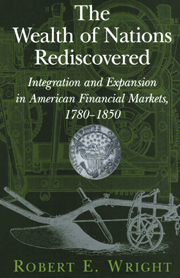 The Wealth of Nations Rediscovered
The Wealth of Nations Rediscovered Book contents
- Frontmatter
- Contents
- List of Tables
- Acknowledgments
- List of Abbreviations
- The Wealth of Nations Rediscovered
- 1 Introduction: The Wealth of Nations and National Wealth
- 2 The International and Colonial Background of America's Financial Revolution
- 3 Banks, Securities Markets, and the Reduction of Asymmetric Information
- 4 The Financial Sector and the Reduction of Lending-Related Costs and Risks
- 5 Evidence of Capital Market Integration, 1800–1850
- 6 Expansion of the Securities Services Sector, 1790–1850
- 7 The Freest of the Free: Regulation of the Financial Sector
- 8 Finance-Directed Economic Development
- 9 Conclusion
- References
- Index
1 - Introduction: The Wealth of Nations and National Wealth
Published online by Cambridge University Press: 16 January 2010
- Frontmatter
- Contents
- List of Tables
- Acknowledgments
- List of Abbreviations
- The Wealth of Nations Rediscovered
- 1 Introduction: The Wealth of Nations and National Wealth
- 2 The International and Colonial Background of America's Financial Revolution
- 3 Banks, Securities Markets, and the Reduction of Asymmetric Information
- 4 The Financial Sector and the Reduction of Lending-Related Costs and Risks
- 5 Evidence of Capital Market Integration, 1800–1850
- 6 Expansion of the Securities Services Sector, 1790–1850
- 7 The Freest of the Free: Regulation of the Financial Sector
- 8 Finance-Directed Economic Development
- 9 Conclusion
- References
- Index
Summary
Rulers, businesses, and scholars have long searched out the causes of wealth. Unfortunately, most of the globe's denizens remain pitifully poor, a threat to the economic and physical security of the prosperous few. One of the most influential books ever written, Adam Smith's An Inquiry into the Nature and Causes of the Wealth of Nations, provided a robust explanation of the causes of economic growth (increased real per capita gross domestic product or GDP), an explanation that the world would do well to study more closely. Some of the intricacies of Smith's thought regarding the financial underpinnings of wealth still elude many theorists and policy makers. Currently, a handful of scholars are explaining and expounding some of those intricacies in the hope that Smith's financial ideas will be put into practice in more places around the globe.
If you do not allow yourself to get bogged down in numbers, or regression equations, and just think about the economic history of the world for the past half millennium in general terms, a few startling observations can be made. First, an abundance of natural resources does not necessarily lead to economic wealth. The most biologically abundant and diverse areas of the globe are also the poorest. Nations with huge tracts of land, enormous numbers of people, and vast deposits of fossil fuels, precious metals, and other riches (e.g., China and the former Soviet Union) are quite poor.
- Type
- Chapter
- Information
- The Wealth of Nations RediscoveredIntegration and Expansion in American Financial Markets, 1780–1850, pp. 1 - 8Publisher: Cambridge University PressPrint publication year: 2002


